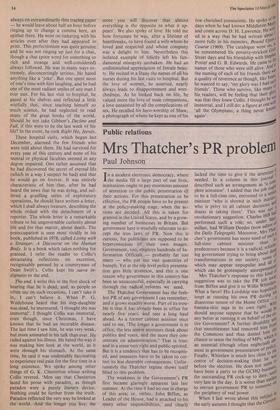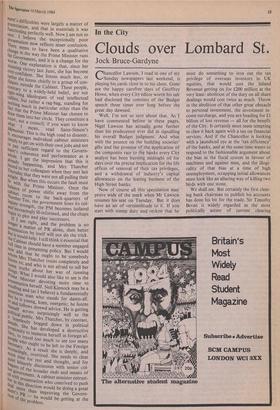Public relations
Mrs Thatcher's PR problem Paul Johnson IIna modern electronic democracy, where the media fill a large part of our lives, institutions ought to pay enormous amount of attention to the public presentation Of their actions. For this presentation to be effective, the PR people have to be present at the policy-making stage, when the ac- tions are decided. All this is taken for granted in the United States, and by a grow- ing number of businesses in Britain. But government here is woefully reluctant to ac- cept the iron laws of PR. Now this is curious, for politicians are supposed to be hyperconscious of their own images. Government, too, employs hundreds of In- formation Officials — probably far too many — who put out vast quantities of bumph. Yet at the tdp level policy presenta- tion gets little attention, and this is one reason why government in this country has been so unsuccessful, especially in carrying through the radical reforms we need.
The Thatcher Government has the feeb- lest PR of any government I can remember, and it grows steadily worse. Part of its trou- ble is that it has already been in office for nearly five years, and sees a long haul ahead. As a former cabinet minister once said to me, 'The longer a government is in office, the less senior ministers think about politics and votes, and the more they con- centrate on administration.' That is true; and in a sense very right and public-spirited. But it is a tendency that has to be recognis- ed, and measures have to be taken to cor- rect its less desirable consequences. Unfor- tunately the Thatcher regime shows itself blind to this problem.
The weakness in the Government's PR first became glaringly apparent late last summer. At the time it had no one in charge of this area; or, rather, John Biffen, as Leader of the House, had it attached to his many other responsibilities, and clearly
lacked the time to give it the attention needed. In a column in this journal described such an arrangement as 'a e° ht plete nonsense'. I added that the job oug,"r to be a full-time one, entrusted to a sells minister 'who is shrewd in such matte' rd who is privy to all cabinet decisions Oa shares in taking them'. This was n°Ld revolutionary suggestion. Charles Htll c. performed such a role; so, under Ni°,4 millan, had William Deedes (now editor °I. the Daily Telegraph). Moreover, Mrs Th‘a a cher's government has more need of stiel:ts full-time cabinet minister than predecessors because it is a radical, ref ing government trying to bring about of transformations in our society, some of which may appear unpopular and all .A. which can be grotesquely misrepresent;/ Mrs Thatcher's response to this kind suggestion was to take the PR job from Biffen and give it to Willie White131); What a farce! His Lordship was honeleshsis inept at running his own PR during his disastrous tenure of the Home Office why banana-skin saga in its own right. ,A should anyone suppose that he would any better at running it on behalf of the eas tire Government? A further disabilitYcvlan that ennoblement had removed hint Irf-he the Commons and thus denied 011 is chance to sense the feeling of MPs, which le, an essential (though often neglected) .ecy. ment in government presentation of P°111,e Finally, Whitelaw is much less close to tl'as centre of decision-making than he vita before the election. He does not seem have been a party to the GCHQ the outstanding PR cock-up to date, 'Tess very late in the day. It is worse than us on to entrust government PR to someone the periphery of real power. tjp When I last wrote about this subjee the early autumn I thought that the 0°ver rnent's difficulties were largely a matter of Presentation, and that in essentials it was functioning perfectly well. Now I am not so sure. I believe the exceptionally poor Presentation now reflects inner confusion. There seems to have been a qualitative change hi the way the Prime Minister runs the Government, and it is a change for the worse. One explanation is that, since her stunning victory last June, she has become over-confident. She listens much less, or rather she listens chiefly to a group of con- fidants outside the Cabinet. These people, contrary to a widely-held belief, are not right-wing ideologues of real intellectual calibre, but rather a rag-bag, standing for nothing much in particular other than the tact that the Prime Minister has chosen to draw them into her circle. They constitute a Court, not a council; if you want to know *hat I mean, read Saint-Simon's
noires. This is the high road to disaster. ,;2ncourages individual cabinet ministers
encourages to get on with their own jobs and not 1&t° Pay sufficient regard to the Govern- 's coherence and performance as a -,""ole• I get the impression that this is ready happening, and Mrs Thatcher ,rhnted to her colleagues when they met last Inorsday that they were not all pulling their weight . But when this occurs the fault must 'Lie with the Prime Minister. Once the 'Wake of power shifts away from the cabinet room to the back-quarters of ,INtlinber Ten, the government loses its col- ,legiate strength, the PM becomes isolated nd in ill-informed, and the chaps begin to plot and play successors. If I am longerright, and the problem is no
a matter l of PR alone, then better ati
present on by itself will not do the trick. ,Ltit it would help. I still think it essential that 'f'tuet Cabinet should have a member engaged now timein presenting policy. But I would ws`hw add that he ought to be somebody iist°10 Mrs Thatcher trusts completely and lie_ens to; and who is not afraid to tell her ih."te truths about her way of running pitgs- What I would also like to see is the ,rule Minister devoting more time to Zvmesentation herself. Neil Kinnock may be a bag and (as I believe) a fundamentally tijiisricitts man who stands for damn-all. hot he is Young, keen, energetic; he listens iird, follows shrewd advice. He is getting oo,.s.elf across surprisingly well to the uhtical details .0poPesusbilic. Mrs Thatcher, by contrast, Y bogged down in political prottis' She has developed a destructive (airs, Is to immerse herself in foriegn af- i Deo'', to travel too much to see too many Seer* who ought to be left to the Foreign iner-r As a result she is deeply, and tore tingly, overtired. She needs to clear e tinte for rest and thought, and for liegalet leis urelY discussion with senior col- lier of the broader ends and means of .g.0vernment.
A cabinet minister entrust-
her who contrived to push deal this direction would be doing a great roent s ,Illore than improving the Govern- r00, 01 the problem.
— he would be getting at the







































 Previous page
Previous page